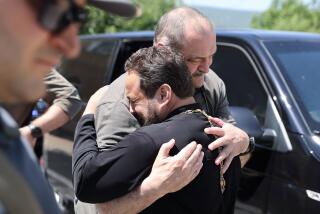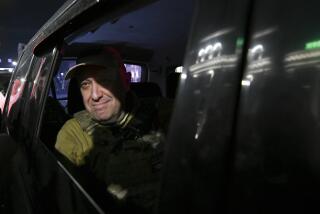Russia Acknowledges Problems in Campaign to Quell Dagestan Crisis
MOSCOW â Amid signs that fighting in the Russian republic of Dagestan has spread into neighboring Chechnya, military officials for the first time acknowledged Thursday that they face serious problems in their bid to control a guerrilla rebellion in Dagestan, a troubled southern region.
Russian planes continued rocket and bomb attacks in the area of seven Dagestani villages seized by Islamic militants who invaded from nearby Chechnya last weekend.
Claims by Moscow in recent days that soldiers of the Interior and Defense ministries and Dagestani police had forced the rebels to retreat appeared increasingly questionable, as a senior official in the regional government acknowledged that the Russian efforts were disorganized.
Several Chechen villages near the border with Dagestan were hit Thursday by Russian bombs and rockets, according to officials in Chechnya. The separatist republic of Chechnya remains part of Russia but has slipped out of Moscowâs control since the 1994-96 Chechen war for independence.
Russiaâs most dangerous security crisis since the Chechen war has come at a bad time for the Kremlin, with President Boris N. Yeltsinâs entourage desperate to stay in power beyond elections scheduled for next July.
The Dagestan conflict has a frightening resonance for Russians, the more so because the Islamic rebels are led by Chechen warlord Shamil Basayev, who is perceived in Russia as a fanatical and threatening enemy. Basayev was one of the most ruthless and formidable rebel commanders during the Chechen war.
Russiaâs acting deputy interior minister, Lt. Gen. Igor N. Zubov, said Thursday that the situation remained grave, with Russian forces facing challenges in operating against the guerrillas in mountainous terrain.
âWe should be clearly aware that it is difficult to achieve an outright victory over guerrilla units,â Zubov said.
Mukhu G. Aliyev, chairman of the Peopleâs Assembly of Dagestan, hinted that, unless federal efforts became better organized, Russia risked losing part of Dagestani territory to the rebels.
âWe have sufficient forces. What we need is better organization,â he said. âWe need better control. We must act more purposely. If we do this, there will be no changes to the map.â
Yeltsin met with security officials Thursday to discuss the emergency. The president said the Russians will reassert control over Dagestan âgradually, without haste, just as it was planned.â
âAlong with Chechnya, this is the most difficult sector,â he said.
But on the sixth day of conflict, some military analysts noted disturbing echoes of the war in Chechnya, where Russia experienced a humiliating defeat and lost control of the region when its troops were forced to withdraw.
Pavel Felgenhauer, military analyst with the Sevodnya newspaper, said a lack of coordination in Russian operations could presage another military disaster for Moscow in the Caucasus.
âIf today [rebel commander] Basayev seriously presses forward in Dagestan, the Russian military may be in for another disaster,â he wrote in the Moscow Times, an English-language daily.
Russia has faced resistance and sometimes open rebellion in the Caucasus since it seized the region more than two centuries ago. The Russian areas of the Caucasus are predominantly Muslim, and religion has often been the vehicle for rebellion.
Russian officials sought Thursday to give reassurances that the crisis will not turn into a second Chechen war. Unlike in Chechnya, where separatist fighters and the population stood together, Russian officials say, there is considerable opposition in Dagestan to the Islamic rebels.
âWe have the support of the leadership and people of Dagestan,â Zubov said.
The Russians have shown reluctance to bomb civilian villages to dislodge the rebels, a strategy that was employed in the Chechen war but could undermine support for Russiaâs efforts in Dagestan. Zubov said the risk of civilian casualties made it more difficult to drive rebels out of three villages.
Alexander A. Konovalov, director of the Moscow-based Center for Military Policy and Systems Analysis, said the Russians are copying the North Atlantic Treaty Organizationâs strategy in Kosovo, relying heavily on airstrikes to minimize casualties.
For several days, senior Russian military officials have been promising a massive attack, and 600 reinforcements were flown to Dagestan on Wednesday. Russian officials estimate that the rebels number as many as 1,500.
Air force commander Col. Gen. Anatoly M. Kornukov said Russian attack and reconnaissance planes had flown 200 missions against the rebel positions.
The Russians claimed to have destroyed two rebel bases, a truck carrying fighters and several antiaircraft guns. They said 150 rebels had been killed. Russian officials have put their own losses at 11 dead and more than 30 injured.
The rebels acknowledged only five dead among their forces and said they had pushed forward into the town of Botlikh and surrounded two brigades of Russian troops, a claim denied by federal officials. The Russians acknowledged that the rebels had hit a helicopter as it landed, wounding three Russian generals and killing a soldier. Neither sideâs claims could be verified independently.
More to Read
Sign up for Essential California
The most important California stories and recommendations in your inbox every morning.
You may occasionally receive promotional content from the Los Angeles Times.










